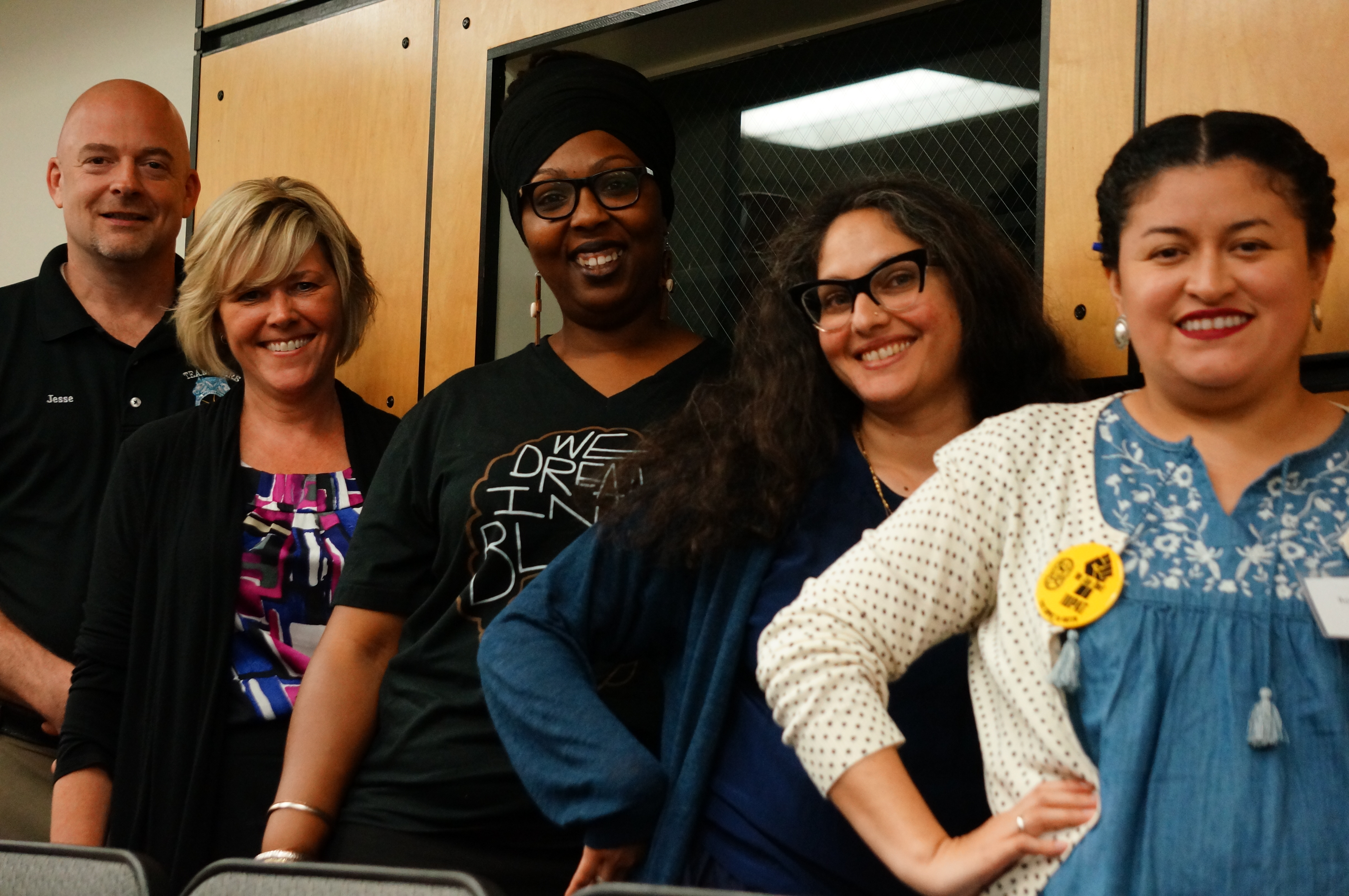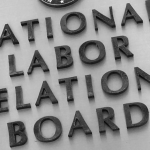Pictured from L to R: Secretary-Treasurer Jessie Case, AFT-WV President Christine Campbell, National Domestic Workers Alliance Lead Organizer Jacklyn Izsraael, Union Communication Services at the Cornell Worker Institute Director Dania Rajendra, IUPAT National Strategic Organizer Rosa Lozano
When a conference keynote speaker says “Our mission is to be the most radical city on the planet”, it gets some attention. Activist and attorney Chokwe Antar Lumumba was elected mayor of Jackson, Mississippi last year and was the much anticipated highlight of the Labor Research & Action Network (LRAN) conference, held at Vanderbilt University in Nashville. He talked about the importance of labor organizing and the development of a cooperative economy in his city. One potential initiative is to fund cooperative business development and use the recently passed 1% sales tax to fund infrastructure improvements performed by a cooperative construction company.
By highlighting the work of the Jackson People’s Assembly, he stressed the importance of local social movement organizing. And recognizing the limitations of electoral politics for radical change, he quotes Andre Lorde’s “the master’s tools will never dismantle the master’s house”, and says he wants to use his time in office as a means to an end of helping to organize people for long term empowerment and self-determination.
This was LRAN’s 8th annual conference, which drew 145 participants. Founded in 2011 by Jobs with Justice, LRAN has over 1,000 members and is a collaboration connecting labor academics and members of labor unions, workers’ centers and community organizations to help worker organizing to build workplace and economic power. Mayor Lumumba’s address reminded the conference that labor and community organizing comes in various forms, and we should think boldly about building power.
Although there is always plenty to discuss at LRAN conferences, this was a particularly interesting time to meet. With the Supreme Court’s Janus decision looming, large teachers’ strikes in a number of states, increased anti-immigrant repression, and a growing gig economy, there was much debate about changes in the labor movement and different forms of organizing.
The opening plenary panel, kicked off by Vonda McDaniel, president of the Nashville and Middle Tennessee Central Labor Council, discussed union organizing in the south and Nashville in particular. Several participants called Nashville the “Crane City” for its construction boom, nearly all of it low wage and non-union, which is also driving gentrification and unaffordability for low income workers. Local activist Odessa Kelly discussed Stand Up Nashville, a labor-community collaboration to fight for responsible development that meets the needs of workers and community members.
Particularly interesting are the alliances that have formed in recent years between the labor and faith communities, for example, the Nashville Organized for Action and Hope (NOAH) coalition. Vanderbilt Theology Professor Joerg Rieger, co-author of the book “Unified We Are a Force” about faith and labor, reminded the conference that religious communities are also a site of organizing, saying “Religion has to be organized just like labor, there is a class struggle in religion, the wealthy donors have too much power.”
Jaxon Dale, a leader of the Amalgamated Transit Union local of city bus drivers described their successful efforts to increase membership and emphasized that back-to-basics member engagement can overcome the challenges of a “right to work” state. Regarding the anti-immigrant environment, Jackie Cornejo of the Partnership for Working Families reminded the audience that “The South has been living in Trump’s America for a long time. Anti-immigrant and anti-worker policies were tested out here.”
Impressive research projects that assist worker organizing are often featured at LRAN conferences. The Partnership for Working Families presented the findings of their report “Build a Better South” which was based on a sophisticated survey of over 1,400 construction workers in six southern cities. They found rampant low wages, wage theft, employment misclassification and unsafe work.
The worker center Workers’ Dignity and the Painters Union discussed their collaboration to help immigrant workers in Nashville organize and fight wage theft. The recent passage of HB 2315 in Tennessee, which requires close cooperation of local law enforcement with ICE, has increased the fear among workers. And organizing construction in Nashville is urgent as there has been an increase in worker deaths in the last few years. The group talked about the developing Rapid Response network which provides support for immigrant workers, and Diana López of Workers’ Dignity discussed the expectation for members to participate in the campaigns, saying “It’s for you today, but it’s for your neighbor tomorrow.”
A panel on “Bargaining Without Bargaining Rights” featured representatives from the West Virginia Education Association and the United Campus Workers from Tennessee in a discussion on how worker organizing can succeed even without formal bargaining. Dana Smith of the United Campus Workers said that without traditional recognition and contracts the union has built a culture of organizing, with constant membership contact and member leadership. The union has only 2,000 members statewide but her colleague Melanie Barron said, “We’re a minority union with a majority mindset.” They successfully fought off an effort by the governor to outsource university facilities jobs.
Chris Brooks of Labor Notes remarked that the teachers’ revolt of 2018 has been driven in large part by the Republican takeover of multiple states and subsequent public sector budget cuts, but we have seen that prohibitions on strikes can be defied with collective action. Indeed, these mass strikes have changed the conversation in the labor movement and provide inspiration for the post-Janus environment we expect.
At the plenary on day two, “Attacks on Workers, Lessons from the Field, and Fighting Back”, panelists discussed various campaigns in tough environments. Jesse Case from the Teamsters in Iowa talked about their struggle against the Republican anti-union assault and their success in keeping their public sector bargaining units certified through deep internal organizing with their members. They have also reconsidered different ways of organizing and have started the Teamsters Community Action Network to train non-members in organizing skills. Regarding the political attacks, including the upcoming Janusdecision, he says “We’re going to organize workers, we don’t need their permission. It doesn’t matter what the laws are.”
Christine Campbell, president of the American Federation of Teachers – West Virginia, talked about the beginnings of the famous teachers and service personnel strike. The union leadership was initially caught by surprise but worked hard to catch up with the members to coordinate a genuine, organic rank and file struggle in the union. Jacklyn Izsraael from the National Domestic Workers Alliance in Atlanta reported that 1,600 members in Georgia have signed their Fair Wage Pledge promising each other that they would not work for less than $15/hour. They are also organizing employers to pay this amount.
A panel on building power through workplace and community research highlighted the importance of engaging workers and community members directly in designing and conducting surveys. Puget Sound Sage in Seattle and United for a New Economy in Denver conducted community surveys on transit development and housing issues to inform policy fights. The Communication Workers of America and the Warehouse Worker Resource Center worked with members to gather corporate outsourcing and health and safety information that was critical for their bargaining and organizing campaigns.
This is the model of “participatory action research” where people are respected and not just the passive research subjects of outside experts. As Sheheryar Kaoosji of Warehouse Worker Resource Center said “We don’t want to use people to prove a point we already have.” This collaborative process can both provide useful new information and serve as an organizing tool.
At the LRAN membership meeting, held at lunch during the conference, members discussed the work of the past year, potential locations for the 2019 conference, and possible new initiatives. LRAN will continue hosting quarterly webinars on labor issues, funding new scholar’s research grants, fostering new project collaborations and will work to expand its website to serve as a broader clearinghouse on labor research materials and reports.
After an exciting two days, LRAN members returned to their communities to continue the hard work of research, organizing and building workers’ power. In these difficult times, this kind of collaborative network is very much needed. More information about LRAN can be found at https://lranetwork.org.
This story was written by Eric Dirnbach, a researcher with the Laborers’ Union and an LRAN Advisory Committee member. This piece was first published on the LRAN website.






